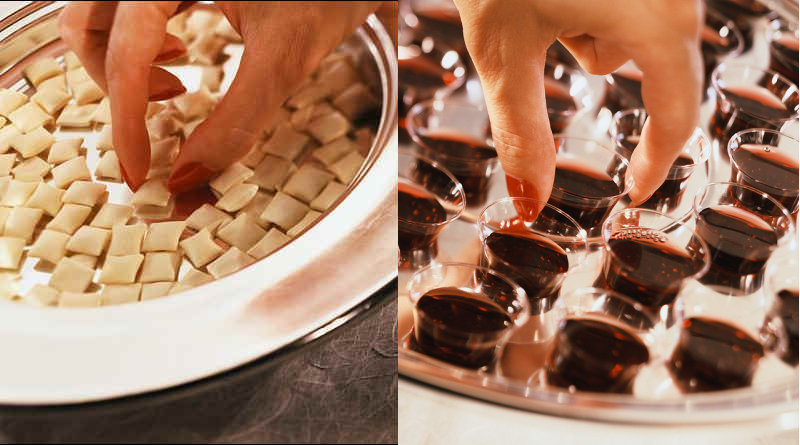Finding Meaning in the Lord’s Supper
Podcast: Play in new window | Download
Subscribe: RSS
 TITLE: Finding Meaning in the Lord’s Supper
TITLE: Finding Meaning in the Lord’s Supper
SUBJECT: Lord’s Supper
PROPOSITION: We find meaning in the Lord’s Supper when we 1) Remember Jesus, 2) Connect with Jesus, 3) Thank Jesus.
OBJECTIVE: Each listener will understand that there is objective significance in observing the Lord’s Supper.
INTRODUCTION:
1. Read: 1 Corinthians 10:16-17
2. About the Text:
1) In this context, Paul contrasts idolatry with partaking of the Lord’s Supper.
2) To partake of the Lord’s Supper is to participate in Christ.
3) Participating in Christ is wholly inconsistent with idolatry.
4) Idols are mute, powerless, and dead.
5) Jesus, however, is vocal, powerful, and alive.
3. How do we find meaning in the Lord’s supper?
1) Do we think about the Lord during the Lord’s Supper?
2) It is easy to just break the bread and sip the cup and let our mind go elsewhere.
3) Is that what Jesus wants?
4) Is that what we really want?
5) “The spirit indeed is willing, but the flesh is weak” (Mark 14:38).
4. Ref. to S, T, P, O, and A.
DISCUSSION: We find meaning in the Lord’s Supper when we . . .
I. Remember Jesus
1. Monuments are important.
1) We have a monument to our veterans in New Boston.
2) We want to remember those who sacrificed.
3) It is appropriate to take time and reflect upon who they were and what they did.
2. The Lord’s Supper is a living monument to Jesus’ death.
1) “And He took bread, gave thanks and broke it, and gave it to them, saying, ‘This is My body which is given for you; do this in remembrance of Me.’ Likewise He also took the cup after supper, saying, ‘This cup is the new covenant in My blood, which is shed for you’” (Luke 22:19-20).
2) We reflect on who Jesus was.
a. The Son of God – John 3:16 – “He gave His only begotten Son.”
b. The Word of God who became flesh – John 1:14 – “And the Word became flesh and dwelt among us, and we beheld His glory, the glory as of the only begotten of the Father, full of grace and truth.”
3) We reflect on what Jesus did.
a. He lived a sinless life – “who committed no sin” (1 Peter 2:22).
b. He died a cruel death – “…the chief priests and our rulers delivered Him to be condemned to death, and crucified Him” (Luke 24:20).
c. He died for others, not for himself – “Christ died for our sins according to the Scriptures” (1 Corinthians 15:4).
4) We remember what he went through on the cross.
a. He wore the crown of thorns.
b. He endured the brutal beating.
c. His hands and feet were pierced with nails.
3. Remembering what Jesus went through for us gives the Lord’s Supper meaning.
II. Connect with Jesus
1. We have mealtime with family.
1) It is a time when we all sit down together at the table.
2) We pass food to each other and eat together.
3) We visit about the day’s events.
4) We do this to show our love for one another.
5) As we connect, we gain a common identity.
2. We connect with Jesus in having this meal with Him.
1) He joins us at this table – 1 Corinthians 10:21 – The Lord’s Table.
2) He eats and drinks with us in the kingdom – Luke 22:16.
3. We identify with His life and teaching.
1) We recognize his graciousness in hosting this supper.
2) “For you know the grace of our Lord Jesus Christ, that though He was rich, yet for your sakes He became poor, that you through His poverty might become rich” (2 Cor.8:9).
3) He has given of Himself to us.
4) “who gave Himself for us, that He might redeem us from every lawless deed and purify for Himself His own special people, zealous for good works” (Titus 2:14).
5) We want to follow Him because of His generosity and love.
4. This is real communion.
1) “The cup of blessing which we bless, is it not the communion of the blood of Christ? The bread which we break, is it not the communion of the body of Christ? For we, though many, are one bread and one body; for we all partake of that one bread” (1 Cor.10:16-17).
III. Thank Jesus
1. Writing thank you cards.
1) We do this when we receive a special gift from someone.
2) We do this when someone does us a great service.
2. We thank God for Jesus’ body and blood.
1) We give thanks for the bread and His body.
2) We give thanks for the fruit of the vine and His blood.
3) 1 Corinthians 11:23-26.
4) This is not just saying a prayer; it is saying “thank you!”
3. We thank Jesus for what He has done for us.
1) He redeemed us – “knowing that you were not redeemed with corruptible things, like silver or gold, from your aimless conduct received by tradition from your fathers, but with the precious blood of Christ, as of a lamb without blemish and without spot” (1 Peter 1:18-19).
2) He saved us – “For by grace you have been saved through faith, and that not of yourselves; it is the gift of God” (Eph.2:8).
3) He forgave us – “In Him we have redemption through His blood, the forgiveness of sins, according to the riches of His grace” (Eph.1:7).
4) He lifted us – “To Him who loved us and washed us from our sins in His own blood, and has made us kings and priests to His God and Father, to Him be glory and dominion forever and ever. Amen” (Revelation 1:5-6).
5) He adopted us – “But when the fullness of the time had come, God sent forth His Son, born of a woman, born under the law, to redeem those who were under the law, that we might receive the adoption as sons” (Galatians 4:4-5).
CONCLUSION:
1. We find meaning in the Lord’s Supper when we . . .
1) Remember Jesus
2) Connect with Jesus
3) Thank Jesus
2. Invitation

